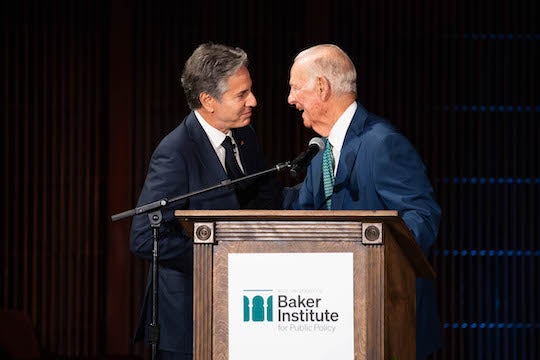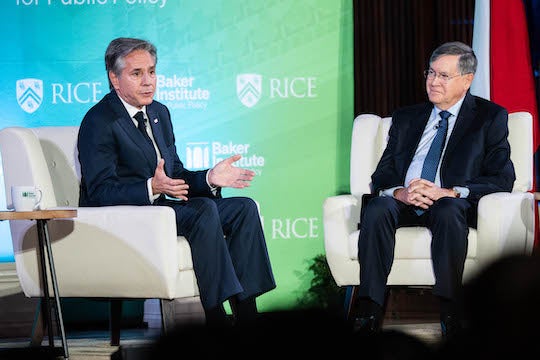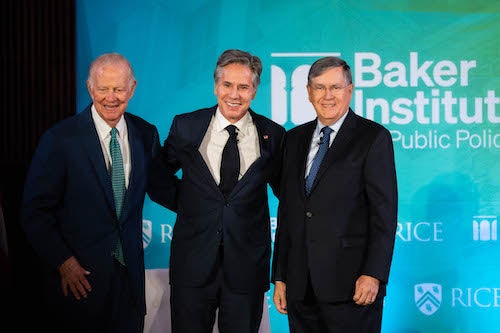U.S. Secretary of State Antony Blinken visited Rice’s campus Oct. 3 to discuss foreign policy and diplomacy at an event held at the Shepherd School of Music’s Stude Concert Hall.

Honorary Chair of the Baker Institute for Public Policy and former Secretary of State James A. Baker III opened the program by sharing his pride that, since its founding in 1993, the institute has been dedicated to bringing the world’s leading diplomats to Rice to share their knowledge and vision with the community.
Baker Institute Director David Satterfield, former U.S. ambassador to Turkey and Lebanon, moderated the conversation with Blinken as they discussed Russia’s invasion of Ukraine as well as America’s relationship with China and Mexico.
“The work we do here, the work we’ve done here over these past 30 years, has focused on local, state, national and international policy issues that are material to the people of the United States, to their prosperity and security,” Satterfield said. “And I know that is the mission of the Department of State as well.”
In light of the institute’s 30th anniversary, Satterfield highlighted an “inflection point” in history three decades ago with the end of the Cold War. Blinken noted that many feel the global community has entered another inflection point today — the end of the “post-Cold War period.”
Blinken highlighted Baker’s work in ending the Cold War. Something that monumental doesn’t just happen, he said.
“In these moments of profound change, it’s easy to feel like you’re in a fog,” Blinken said. “It’s hard to see the exact contours of what’s actually happening, but real leaders like Secretary Baker move forward. They act. They make decisions. And I think, as former President (George H.W.) Bush said, that’s exactly what Jim Baker was doing when others were still trying to understand what was happening. He was acting and he was getting things done.”
Russia has resurrected a similar “expansionist, xenophobic, paranoid, imperialistic” climate, Satterfield said. Blinken agreed that Russian President Vladimir Putin has rejected principles of the world order that arose out of the end of the Cold War such as territorial sovereignty and independence.

“When you look at what’s happened in Ukraine, I think Americans are offended at the idea of one country simply going in and bullying its neighbor in a way that Russia has done to Ukraine with the horrific human cost that we have seen,” Blinken said. “But I think people also understand that if Putin’s allowed to get away with this, if he’s allowed to act with impunity in Ukraine, the message to would-be aggressors anywhere and everywhere is ‘we can get away with it, too.’ And that’s an invitation to a world of conflict.”
Blinken acknowledged that Americans can get frustrated by the economic support and humanitarian assistance going to Ukraine because “it seems like we are carrying so much of the load.”
“We are,” he said. “But in terms of burden sharing in this particular instance, the rest of the world is doing a remarkable job. In fact, the assistance being provided by other countries exceeds the assistance that the United States has provided — as significant as that’s been. So we’re in this with 50 other countries.”
The role and responsibility of the secretary of state, inspired by Baker, is to work with other countries, organizations, businesses and non-governmental actors to try and build consensus in the approach that the global community takes against the challenges and uncertainty we face today, Blinken said.
Baker will host a conversation with two other former secretaries of state, Henry Kissinger and Hilary Clinton, at the institute’s 30th anniversary gala Oct. 26.
View Blinken and Satterfield’s whole conversation here.

